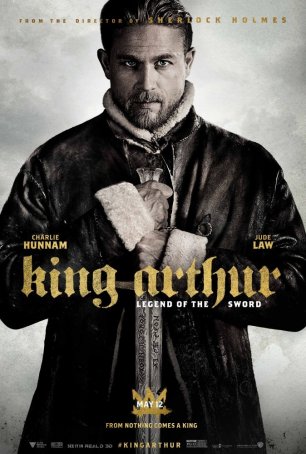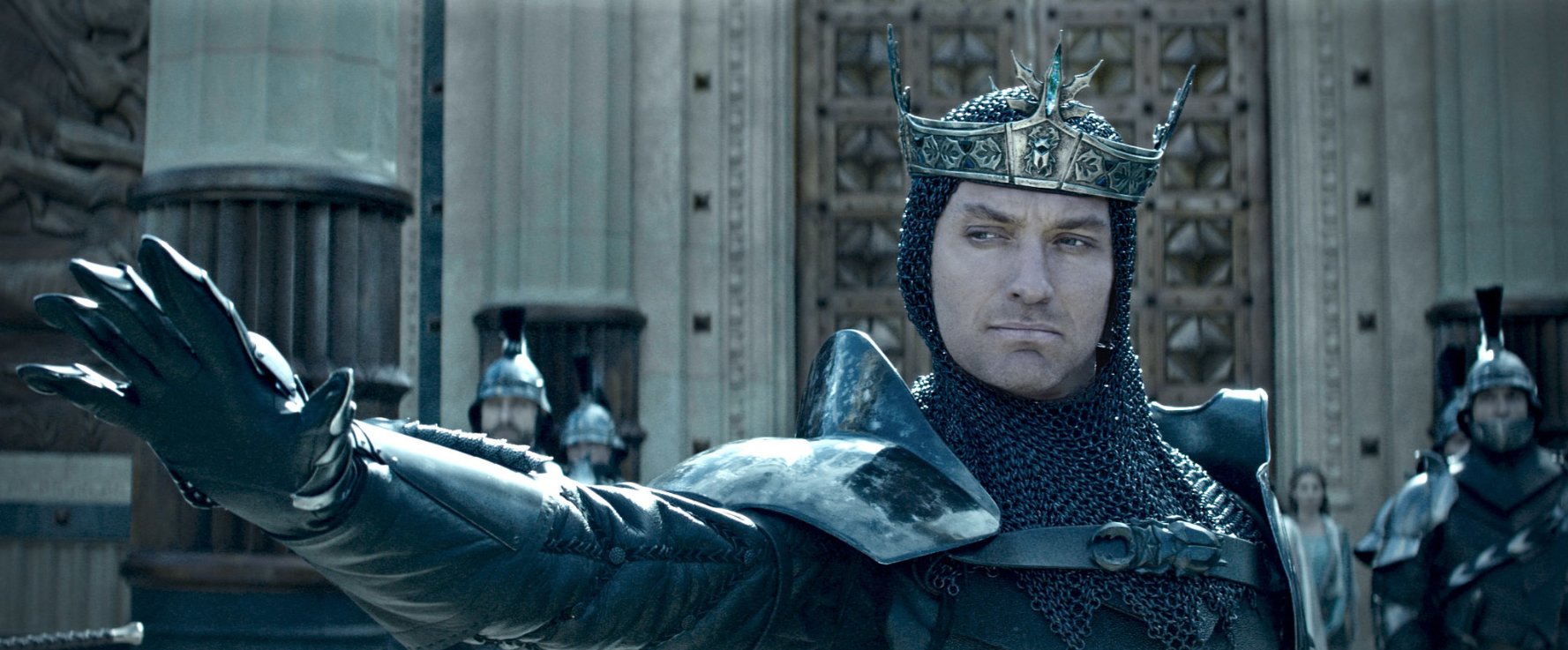King Arthur: Legend of the Sword (United States, 2017)
May 11, 2017
The most important name associated with this new telling of the tale of King Arthur is “Guy Ritchie.” More than most working directors, Ritchie comes to projects with his own specific take on them – one that inevitably rubs some viewers the wrong way. Such is the case with King Arthur: Legend of the Sword, the first in a proposed multi-film arc recounting the exploits of the king, his knights, and his enemies. Whether or not a historical Arthur existed isn’t of any more concern to Ritchie than the previous literary, TV, and cinematic explorations of his myth. With Legend of the Sword, the filmmaker isn’t remaking or adapting anything. This is his version of Arthur’s origin story and, if nothing else, it’s kinetic and attention-grabbing.
Fortunately for Ritchie, there is no canonical King Arthur story. In fact, there are so many variations that a filmmaker can cobble together the iconic elements and come up with whatever he or she wants – which is essentially what Ritchie has done. He’s not unique in bending things to suit his personal narrative and style. Arthurian legend has been interpreted by the likes of Mark Twain, Mickey Mouse, and Monty Python, with various “serious” interpretations (Excalibur, Antoine Fuqua’s King Arthur) in between. Present in Legend of the Sword are (in addition to Arthur) Mordred, Vortigern, Sir Bedivere, Guinevere (she is never named in the movie but the studio’s supplemental material identifies her), Uther Pendragon, Excalibur, The Lady of the Lake, and (briefly) Merlin. Notably absent are Lancelot, Gallahad, and various other knights.
 Since the eventual goal is to tell The Legend of Camelot
According to Guy Ritchie, Arthur’s beginnings seem like a good place to start. When
the action begins, Arthur is just a child. His father, Uther Pendragon (Eric Bana)
rules Camelot and takes down an invasion force led by the dreaded mage Mordred.
But vanquishing the danger from outside doesn’t protect him from the rot within
as his brother, Vortigern (Jude Law), orchestrates a bloody coup that leaves
Uther and his wife dead. Arthur, smuggled out aboard a lifeboat, becomes an
orphan in Londinium, where he is raised in a brothel.
Since the eventual goal is to tell The Legend of Camelot
According to Guy Ritchie, Arthur’s beginnings seem like a good place to start. When
the action begins, Arthur is just a child. His father, Uther Pendragon (Eric Bana)
rules Camelot and takes down an invasion force led by the dreaded mage Mordred.
But vanquishing the danger from outside doesn’t protect him from the rot within
as his brother, Vortigern (Jude Law), orchestrates a bloody coup that leaves
Uther and his wife dead. Arthur, smuggled out aboard a lifeboat, becomes an
orphan in Londinium, where he is raised in a brothel.
Twenty years later, Arthur (Charlie Hunnam), is brought to Camelot like all males of his age, to see if he can pull the sword Excalibur from a stone – a test instituted by Vortigern to find his lost nephew. When Arthur completes the task, he is immediately imprisoned and scheduled for execution. However, planning to kill the rightful king and completing the job are different matters. Aided by the mage Guinevere (Astrid Berges-Frisbey), the knight Sir Bedivere (Djimon Hounsou), and the small-fingered Goosefat Bill (Aidan Gillen), Arthur escapes and joins a group dedicated to removing Vortigern from power – a task that will require might, magic, and a little luck.
Ritchie’s style is evident throughout. Exposition-laden breaks are minimal with the focus being on keeping things moving. The pace is relentless and, even when not a lot happens, Ritchie uses every trick in his book to stave off audience restlessness. At times, he overreaches. His tendency to employ flash-forwards to propel the narrative forward is more distracting than visionary. It’s unnecessarily showy and more likely to take the viewer out of the moment than provide for greater immersion. There are, of course, numerous battle scenes, all of which are expertly choreographed. Ritchie also doesn’t allow things to get bogged down with subplots. One side-quest, which has Arthur battling all manner of giant animals, takes less than five minutes of screen time.
The film’s look is one of its assets. Visually, it’s an easy match for the darker, seedier portions of Peter Jackson’s Middle Earth and proves to be one of the best realized early Medieval settings captured on film. The CGI is well integrated so, even when there are monsters (like the huge battle elephants), magic, and massive armies, it never seems like we’re looking at something animated. Although Legend of the Sword rarely feels like traditional fantasy, informed as it is by Ritchie’s ADD approach to directing, it often looks like it.
 No big-name actor was called upon to provide a boost by the
use of his/her name. Charlie Hunnam is a capable superhero-type King Arthur
with the right mix of self-doubt and self-deprecating wit. Jude Law slithers
nicely into the villain’s role – hard to believe that there was a time when he
was routinely cast as a hero. Of course,
he and Ritchie are familiar with one another from Sherlock Holmes and its sequel, in which Law played Dr. Watson.
Aidan Gillen and Djimon Hounsou are at home in period roles, with Gillen not
having to adjust much from Westeros. Astrid Berges-Frisbey is appealing as the
mysterious Mage With No Name who apparently is Guinevere.
No big-name actor was called upon to provide a boost by the
use of his/her name. Charlie Hunnam is a capable superhero-type King Arthur
with the right mix of self-doubt and self-deprecating wit. Jude Law slithers
nicely into the villain’s role – hard to believe that there was a time when he
was routinely cast as a hero. Of course,
he and Ritchie are familiar with one another from Sherlock Holmes and its sequel, in which Law played Dr. Watson.
Aidan Gillen and Djimon Hounsou are at home in period roles, with Gillen not
having to adjust much from Westeros. Astrid Berges-Frisbey is appealing as the
mysterious Mage With No Name who apparently is Guinevere.
Ritchie and the producers have been open about Legend of the Sword being the first film in a cycle, although it is sufficiently close-ended that it could stand on its own if no sequels are commissioned. One has to wonder about the film’s box office potential, however. Warner Brothers has given it an unenviable opening date and advance buzz is tepid. As a result, it might be best to enjoy this iteration on its own merits without an expectation of additional segments. Admittedly, it’s entertaining to enjoy Ritchie’s spin on the material but, when it comes to King Arthur, give me The Black Knight and Brave Sir Robin any time.
King Arthur: Legend of the Sword (United States, 2017)
Cast: Charlie Hunnam, Jude Law, Djimon Hounsou, Astrid Berges-Frisbey, Aidan Gillen, Eric Bana
Home Release Date: 2017-08-08
Screenplay: Joby Harold and Guy Ritchie & Lionel Wigram, based on a story by David Dobkin and Joby Harold
Cinematography: John Mathieson
Music: Daniel Pemberton
U.S. Distributor: Warner Brothers
U.S. Release Date: 2017-05-12
MPAA Rating: "PG-13" (Violence, Profanity, Brief Nudity)
Genre: Fantasy/Adventure
Subtitles: none
Theatrical Aspect Ratio: 2.35:1

Comments